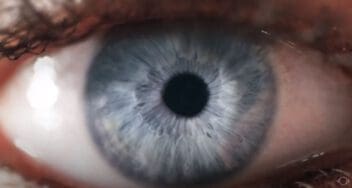Lupus & Eye Issues
Home / Vision Education Center /
Last Updated:
Table of Contents
Lupus is an autoimmune disease that has several symptoms, including inflammation, joint pain, fatigue, skin rashes, hair loss, and eye issues. There are several eye issues associated with lupus, including dry eyes, inflammation, damage to the retina, and nerve damage.
While getting treatment for lupus is important, medications that treat this autoimmune condition can also cause eye issues.
People with lupus are not good candidates for LASIK, an elective procedure to improve visual acuity.
It is sometimes necessary for people with lupus to undergo an eye surgery, like cataract removal. With appropriate treatment, these operations typically have good outcomes.
How Lupus Affects Vision & Causes Eye Issues

Lupus is an autoimmune condition that can manifest in several ways. There is a range of potential symptoms, so one person with lupus may not have the same symptoms as someone else.
In the United States, about 16,000 people are diagnosed with lupus every year. The Lupus Foundation of America reports that about 1.5 million people in the country live with lupus.
You deserve clear vision. We can help.
With 135+ locations and over 2.5 million procedures performed, our board-certified eye surgeons deliver results you can trust.
Your journey to better vision starts here.
Symptoms associated with lupus include:
- Muscle and joint pain or stiffness, with or without swelling.
- Prolonged fatigue.
- Skin rashes, especially on parts that are exposed to the sun.
- Fever above 100 degrees Fahrenheit.
- Chest pain due to lung inflammation.
- Hair loss, which could be from skin problems or medications taken to treat lupus.
- Ulcers in the mouth, most often on the roof but sometimes on the gums, tongue, lips, and inside the cheeks.
- Trouble with memory.
- Higher risk of blood clots.
- Eye diseases, ranging from dry eye to vision loss.
Both lupus itself and medications used to treat lupus can cause a range of eye conditions. If you are diagnosed with lupus, it is important to understand these, so you can work with your doctor and your optometrist to monitor vision changes.
Common Eye Issues Associated With Lupus
The eye is considered an immune privileged organ, meaning it is much more protected from accidental attack from the body’s immune system than other parts. However, autoimmune diseases cause the immune system to go into overdrive, attacking healthy tissue in the body and triggering a range of symptoms, including in the delicate eye.
There are several ways that lupus can affect the eyes, and there are different approaches to managing or treating symptoms. Here are some of the more common eye issues that you may develop if you have lupus:
Skin problems around the eyelids
This is most common with discoid lupus erythematosus, which is a type of lupus that mostly affects the skin. Lesions can develop on the skin, around the eyes, and on the eyelids. These may be scaly, raised, or well-defined. If they become pronounced, they may lead to scarring around the eyes or on the eyelids, but they should not affect vision The lesions themselves will not affect vision much either, though they may cause some itching and burning, which might lead to scratching the affected area.
Dry eye
Many people have dry eyes, but for people with lupus, this is often associated with a secondary condition called Sjogren’s syndrome. The main symptoms of this syndrome is lack of tear production in the tear glands. Other parts of the body, like sweat glands, are also affected. Common symptoms are itching, red, or burning eyes, and feeling the need to use eye drops to keep vision clear and comfortable. Advanced cases of dry eye that do not receive appropriate treatment can cause scarring on the conjunctiva and cornea, which can lead to blurry or poor vision.
Scleritis
This condition causes red, painful eyes as the sclera, or the outer white part of the eye, becomes inflamed. About 1 percent of people with lupus develop scleritis, but it can also be the first symptom a doctor associates with the condition.
Uveitis
Like scleritis, uveitis is inflammation of one layer of the eye that can cause vision problems. If untreated, it can lead to vision damage. The uvea is the middle layer of the eye that contains many blood vessels.
Conjunctiva issues
The conjunctiva is the mucus membrane that covers the sclera and lining of the eye, protecting many of the delicate internal parts from outside damage. This membrane may become inflamed, leading to red, dry eyes, pain and itching from conjunctivitis. Extreme versions of this condition can lead to conjunctival ulcers.
Retinal vascular lesions
As the immune system attacks blood vessels, changes occur that can cause lesions, leading to scarring and poor blood supply to the back of the eye, especially the retina. This is one of the most common eye issues caused by lupus, with as many as 28 percent of people who have the condition developing this problem.
It can be a sign that lupus is active and not being treated appropriately. Without treatment, loss of blood flow to the retina can lead to very poor vision.
Eye infections
Inflammation and damage to various parts of the eye, along with an immune system that is overwhelmed, can lead to infections in the eye that require medical treatment.
Nerve damage
As the immune system attacks various parts of the body, nerves can become damaged, including in the eye. Optic neuropathy, or damage to the optic nerve that communicates to the brain, occurs in about 1 to 2 percent of people who have lupus. Damage to visual nerve fibers in the brain, which receive signals from the optic nerve, can cause vision loss. Damage to the cranial nerve leading to palsy can also cause vision problems, but this is a form of brain damage rather than damage to the eye itself.
Medications for Lupus That Can Cause Eye Issues

The three medications most often prescribed to people with lupus are:
- Immunosuppressant drugs like methotrexate and mycophenolate.
- Anti-malarial drugs like hydroxychloroquine.
Medications that directly suppress the immune system can increase the risk of infection, as the immune system will be less able to respond. However, they can reduce the complex, painful immune response while the system attacks the rest of the body.
Steroids also reduce inflammation, but these have several side effects, no matter how they are administered, including increasing the risk of glaucoma.
Anti-malarial medications are considered the safest for the eyes, so if you have an increased risk of eye issues, you may wish to speak to your doctor about these rather than other medications. It is important to follow your doctor’s advice to treat lupus, and report any symptoms so these can be managed. Anti-malarial medications can also damage the retina, so they are not completely safe from causing eye issues.
You deserve clear vision. We can help.
With 135+ locations and over 2.5 million procedures performed, our board-certified eye surgeons deliver results you can trust.
Your journey to better vision starts here.
LASIK & Lupus
Refractive errors like nearsightedness, astigmatism, and farsightedness are the most common eye issues in the United States. Many people who have lupus also have a refractive error, and they may consider LASIK if they want to improve their vision without contact lenses or glasses.
However, the United States Food and Drug Administration (FDA), which approved LASIK as an outpatient procedure, notes that people with autoimmune conditions like lupus are not good candidates for this procedure.
Since lupus causes the immune system to attack healthy tissue, healing after any surgical procedure will take longer and can cause more scarring or side effects. This is true of LASIK as well as necessary eye surgeries.
Necessary Procedures Like Cataract Surgery
Cataracts are common in people who have lupus, just as they are common in the general population. Steroid medications can increase your risk of developing cataracts sooner, so if you take these medications, inform your optometrist so they can monitor your vision.
Your eye doctor will monitor the progression of your cataracts after they are diagnosed. They will inform you when it is time to remove the damaged lens and replace it with an artificial lens.
People who have lupus typically have good outcomes from cataract surgery, as surgeons and ophthalmologists can manage medications and healing rates to ensure their patients are healthy and safe. It is important to listen to your doctors and follow their aftercare steps.
The American Optometric Association (AOA) recommends that anyone with lupus get annual eye exams regardless of age and overall eye health. This will help you get a diagnosis for potential eye issues as soon as possible. If you have any sudden changes to your vision, report these to your eye doctor.
You deserve clear vision. We can help.
With 135+ locations and over 2.5 million procedures performed, our board-certified eye surgeons deliver results you can trust.
Your journey to better vision starts here.
References
- What Is Lupus? (January 2020). Medical News Today.
- Lupus Symptoms. (October 2018). Centers for Disease Control and Prevention (CDC).
- Eye Problems in Lupus. (May 2011). Hospital for Special Surgery.
- How Lupus Affects the Eyes. (July 2013). Lupus Foundation of America.
- When Is LASIK Not for Me? (July 2018). U.S. Food and Drug Administration (FDA).
- Risk Factors for Cataracts in Systemic Lupus Erythematosus (SLE). (September 2014). Rheumatology International.
- How Safe Is Cataract Surgery as a Lupus Patient My Condition Has Been Stable for Over 12 Months? Lupus Trust.
This content is for informational purposes only. It may have been reviewed by a licensed physician, but is not intended to serve as a substitute for professional medical advice. Always consult your healthcare provider with any health concerns. For more, read our Privacy Policy and Editorial Policy.
